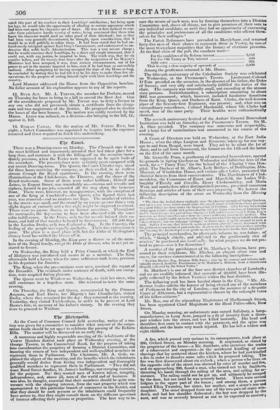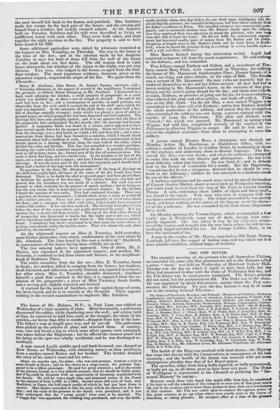the aunt herself fell back in the flames, and perished.
Mrs. Smithers • made her escape by the back part of the house ; and the serving-girl leaped from a window, but luckily escaped unhurt. At the Inquest, held on Tuesday, Smithers and his wife were described as living on .indifferent terms with each other. They were both sober, and slept together the night previous to the fire. The property is said to have been insured for 700/.
Some additional particulars were stated by witnesses examined at the inquest on Mrs. Twamley, on Thursday. She was in the house at the time of the fire ; and in the attempt made by her daughter
Caroline to save her, both of them fell from the wall of the -house on the leads about ten feet down. The old woman died in eight
.hours afterwards, but whether of the injury or the fright, was not very obvious. Two men, who lodged in the house, escaped from the first-
• floor window. The most important evidence, however, given at the adjourned inquest, respected the origin of the dre. We quote from the Chronicle— Henry R. Abraham, John Street, St. James's Square, surveyor, said— Yesterday afternoon, at the request of several of the neighbours, I examined the premises in Oxford Street belonging to Mr. Smithers. I discovered in a - back vault adjoining the kitchen, a small quantity of gunpowder in a card, which was doubled up, to form a sort of trough or channel. The end of the card had been on fire ; and a continuation of powder, in small portions, was observable from the card until it reached the end of the shelf upon which the card was deposited. At the extremity of the shelf; there was about half a hat- full of shavings conically arranged ; under which was placed a piece of oiled or greased paper, on which gunpowder had been deposited and had exploded. The shavings had been only partially ignited ; and it is my opinion that the blast of the gunpowder had extinguished the fire shortly after the shavings had become ignited. A turpentine bottle was found in a corner, and it appeared to have been turned upside down for the purpose of draining. About two feet six inches from the shavings, was a deal board, on which a fire had been laid ; and a com- munication from thence had been formed to a coal-bin, which I should think contained about half a chaldron of coals. There was also a continuation of deal boards placed in a slanting direction along the west wall of the cellar, which divided the cellar and kitchen. This line was extended to a wooden partition, dividing the vault which remained unseared by the fire. A quantity of lumber, • such as old baskets, boxes, &c., formed part of the line of communication. The . vault is thirty feet long, and has a brick arch. In the kitchen at the foot of the
stairs, are a water-closet and a copper ; and here I found the remains of a sack of shaving.s. It was the lower part of the sack that remained, and I should think . about half a bushel of shavings were left unconsumed."
To questions by the Jury, Mr. Abraham said—" If the heap of shavings on the shelf had caught light, all traces of the cause of the fire would have been destroyed. There is no doubt the oiled or greased paper had been placed there to facilitate the ignition of the shavings. The notion, however, was bad, and proved that the incendiary was not much of a chemist. The card was also greased or oiled, evidently for the purpose of speedy ignition ; but its being so, • was the very reason that it acted quite in a coutrary manner. In the kitchen I found the remains of two sacks. They had contained shavings. There was a quantity of shavings unconsumed ; I should think about as many as would fill half a bushel measure. There was also a great quantity of wood ashes about the floor ; and a saucepan was filled with ashes, which might have contained combustible matter.' It has not been analysed. The shavings were placed light before the door of the water-closet, and partly obstructed the stairs. It is my opinion. they were not laid there casually. The top of the shelf where the train of gunpowder was discovered is burnt, but the under part is not so ; which proves that there could have been no fire below it. The water-closet is entirely burnt. I should say that the fire originated in or close upon the water-closet, or perhaps immediately under the kitchen stairs. That was almost the only place ignited by the incendiary."
At the adjourned inquest on Miss A. Twamley, held yesterday, some further particulars were stated, confirmatory of the view taken by Mr. Abraham. The Jury found in this case a verdict of " Murdered, in consequence of the house having been wilfully set on fire."
The two missing lodgers have appeared. One of them, Mr. S. Davies, was examined at the adjourned inquest ; and another, Mr. Geismar, is confined to bed from burns and bruises, in the neighbour- hood of Rathbone Place.
The entire casualties from the fire are—Miss E. Twamley, burnt to death; her mother, killed in escaping from the house ; her nephew, skull fractured, and otherwise severely bruised, not expected to recover; her elder sister, Miss C. Twamley, shoulder dislocated ; Smithers
• himself, a good deal scorched in the face, it is supposed from the ex- plosion of the gunpowder ; a niece of Miss Twamley, Sarah Smith, and a serving-girl, slightly scorched and bruised.
• A warrant for the arrest of Smithers, on the capital charge of arson, has been issued, and he is in custody at the Hospital. There appears -nothing in the several examinations to implicate Airs. Smithers.



























 Previous page
Previous page